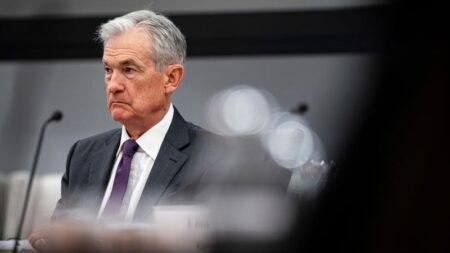In recent reports regarding the UK’s economic situation, significant concerns have emerged, suggesting that the nation is on a trajectory towards notable tax increases. Faisal Islam, the Economics Editor, highlights this pressing issue against the backdrop of the country’s fluctuating growth and rising government debt.
The gloomy economic figures released last Friday showed a further decrease in the UK’s growth, measured by Gross Domestic Product (GDP), particularly noting a dip in May. Adding to the sense of urgency, the Office for Budget Responsibility (OBR) provided a sobering forecast, indicating that the UK’s government debt could potentially rise to an alarming three times the size of its economy over the next fifty years. Such an outlook raises critical questions about fiscal sustainability and the government’s capacity to meet its financial commitments.
This juxtaposition of short-term economic metrics and long-term debt forecasts presents a complex challenge for policymakers. Typically, month-to-month GDP figures can be erratic, and long-term projections about public finances may seem distant and less urgent. Nevertheless, in this instance, the two angles converge to signal an impending need for difficult financial decisions in the near future.
A noteworthy aspect of the OBR’s report was the candidness of its Chair, Richard Hughes. He articulated that “the UK cannot afford the array of promises” made to the populace, especially when grounded in realistic assumptions concerning costs and economic growth. His comments underscore a historical pattern of U-turns on both tax and spending commitments by various governments. The recent government reversals regarding welfare modifications and winter fuel payments exacerbated the sense of financial unpredictability.
Among various advanced economies, the UK’s debt is highly significant—ranking sixth highest, with annual borrowing positioned as the fifth highest and borrowing costs marked as the third highest. Such statistics reveal the vulnerability of the UK’s economy in comparison to its global peers. More alarmingly, the OBR’s commentary indicates that ongoing reliance on borrowing cannot effectively alleviate the increasing day-to-day expenditure pressures, which is a concern shared across the economic landscape.
Despite the demand for increased spending, influenced by ongoing geopolitical shifts and societal changes, the OBR’s forecasts point to a potential reduction in disability cases by 2029. This prediction faces uncertainties as local councils allocate 58% of their revenue towards social care, with some going as high as 80%. Additionally, a major financial arrangement to support burgeoning special educational needs (SEN) budgets poses risks of bankrupting local authorities.
The government’s commitment to increase defense expenditure in line with NATO’s 3.5% target also looms large, predicting a cost of nearly £40 billion annually by 2035. This commitment adds another layer of strain amid concerns that growth in public spending is not matched by revenue generation.
As we turn towards autumn, the anticipated budget may unveil tax increases ranging from £10 billion to £20 billion. Notably, the political landscape appears quite precarious; a government with significant parliamentary backing typically possesses the power to implement necessary fiscal measures. However, the recent hesitance in addressing taxation openly with the public raises significant questions about the leadership’s authority and capability.
The Chancellor, Rachel Reeves, is faced with the daunting task of maneuvering through these economic challenges. In an attempt to align with her self-imposed borrowing limits, she may consider adopting a more flexible approach to budget adjustments, potentially consolidating changes to once a year. The necessity of a comprehensive approach to the upcoming budget is paramount, as ministers explore ways to optimize savings within health-related welfare bills, particularly in the context of mental health.
Ultimately, the path ahead involves navigating complex fiscal waters where the expectation of tax hikes is intertwined with broader economic revitalization strategies. The upcoming budget will require a deft balance between taxation, spending cuts, and investing in sustainable growth initiatives to stabilize the UK’s economic framework. As the conversation unfolds around welfare and taxation, the hope remains that a return to robust growth will temper some of the impending fiscal pressures the country faces.










